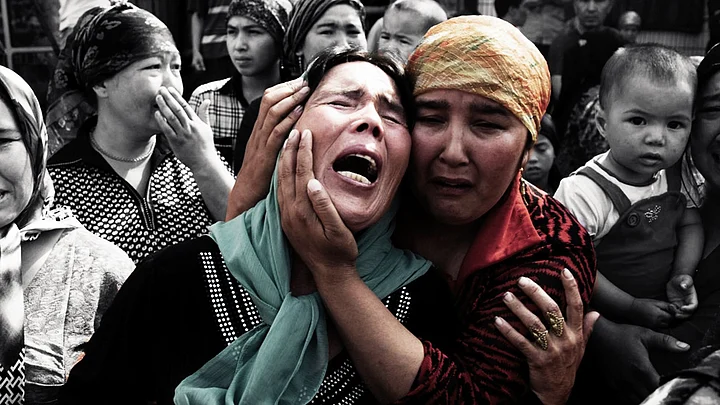(This story was originally published on 1 June 2022. It is being republished from The Quint's archives in light of the publication of a UN report accusing China of committing "serious human rights violations" against Uighur Muslims in Xinjiang on 31 August.)
The Uighur internment camps with an estimated 1 million incarcerated minorities in Xinjiang in China continue to prick the global conscience. The issue is snowballing into allegations of genocide, leading to renewed tensions between western countries and China. In addition, Uighur links to turbulent Afghanistan also highlight regional security dimensions.
Recently, the UN High Commissioner for Human Rights, Michelle Bachelet visited Kashgar, Urumqi and Guangzhou from 23 to 28 May, and after discussions with the concerned stakeholders, she stated that she raised the issues of “lack of independent judicial oversight of the operation of the program, the reliance by law enforcement officials on 15 indicators to determine tendencies towards violent extremism, allegations of the use of force and ill-treatment in institutions, and reports of unduly severe restrictions on legitimate religious practices”.
Recently, the UN High Commissioner for Human Rights, Michelle Bachelet visited Kashgar, Urumqi and Guangzhou from 23 to 28 May. This is the first visit of the UN human rights body to China in 17 years.
The visit coincided with the release of Xinjiang Police Files, along with a number of classified documents on the situation in these camps.
The West has expressed disappointment over Bachelet's 'controlled' visit and criticised her for her 'soft' position.
This is the first visit of the UN human rights body to China in 17 years. While Bachelet criticised China’s “arbitrary and indiscriminate” human rights violations in Xinjiang, critics pointed to her “controlled visit”, as also her soft position.
The 'Xinjiang Police Files'
The visit coincided with the release of Xinjiang Police Files, along with a number of classified documents on the situation in these camps. Adrian Zenz, a China expert banned along with European parliament members and others by China for work on exposing the internment camps, had published these files in peer-reviewed journals. The cache included 2,800 images of detainees, 3,00,000 personal records, 23,000 detainee records and more than ten camp police instructions.
Considerable evidence thus suggests the precariousness of Uighur lives. They not only became minorities in their own land with the Han nationals’ influx but also lost public positions in legislature, bureaucracy, police, judiciary, economy and media establishments. Infrastructure projects under Western Development Campaign and the recent Belt and Road Initiative exacerbated this.
This coincided with the revisions in China’s ethnic policies from an integrationist to an assimilationist agenda, reflected in the “Sinification” campaign in Xinjiang, Tibet and Inner Mongolia. Intensive residential surveillance – as Bachelet noted in her press briefing – religious curbs, demolition of mosques, disallowing of Friday prayers and wearing beards, all have stifled Uighur lives.
Uighur discontent had resulted in a number of incidents, of which the 5 July 2009 violence at Urumqi remains widespread, with the killing of 187 people in just a few hours. There were also periodic bomb explosions, knife attacks at a railway station in Kunming in 2014, a car explosion at Tiananmen Square in 2013, etc.
Noticeably, much of the Uighur political violence is against state systems like military, para-military forces and others in the region.
China's 'Strike Hard' Policies
China, on the other hand, argued that these camps were vocational education and training centres meant for temporary skill up-gradation units. In the light of the spread of extreme religious ideas leading to terror activities across the globe, and taking advantage of the post-9/11 global consensus on counter-terrorism, China intends to eradicate violent incidents involving Uighurs by introducing structural and systematic changes and through a controversial “people’s war on terror” campaign since 2014.
They cite the Communist Party’s mission as ushering in ethnic harmony, stability and economic development. Began under the party secretary of Xinjiang Chen Quanguo, these “strike hard” policies have become controversial as they targeted entire communities rather than individual “terrorists”.
Xinjiang’s political activities also need to be curbed as it had an independent history in 1933-34 and 1944-49 under the East Turkistan Republic. If such fissiparous sentiments remain, there is the danger of China meeting a Soviet disintegration-like fate.
China had roped in the Shanghai Cooperation Organisation to curb “three evils” – separatism, extremism and splittism – with diplomatic, political and law and order curbs imposed on member states. It also conducts annual “peace mission” paramilitary exercises to avoid any violent incidents in the region.
For China, Xinjiang is a crucial part of its national security, with the region occupying nearly 1/8th of its territory. It has significant oil and strategic resources, such as uranium, as well as transportation hubs. It also occupies a strategic location as it borders eight countries, and hence, has foreign policy implications.
The Threat From Taliban Takeover of Afghanistan
Also, with the Taliban takeover of Afghanistan last year, the threat of militancy spreading into the Xinjiang borders with Badakhshan has increased significantly. By appointing a new military commander, Wang Haijiang, for the Western Theatre Command, China intends to create a buffer zone in the region to stop any Uighur insurgents from crossing over. Beijing has also raised a mobile military base in cooperation with Tajikistan to address this issue.
That China’s handling of the Xinjiang issue has become an international concern is seen in the western sanctions on Chinese officials involved in repressive policies against Uighurs. The US, the European Union, Canada, Japan and others have been critical of such regional leaders and expressed disappointment over Bachelet’s visit.
(Srikanth Kondapalli is Dean of School of International Studies at Jawaharlal Nehru University. This is an opinion article and the views expressed are the author's own. The Quint neither endorses nor is responsible for them.)
